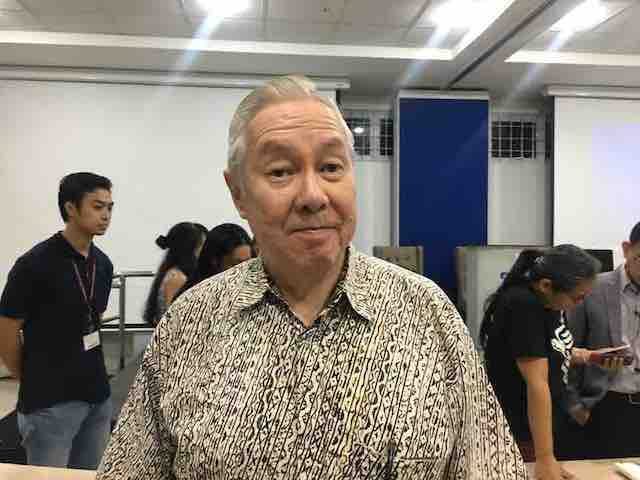SUMMARY
This is AI generated summarization, which may have errors. For context, always refer to the full article.

MANILA, Philippines – Polling firm Social Weather Stations (SWS) vowed it would not allow itself to be used to promote lies, authoritarianism, and undemocratic change.
Dr Mahar Mangahas, SWS president, cited the challenges of non-partisan research, especially on the controversial bid of the government for charter change (Cha-Cha) and federalism.
“On our part, we will be very careful not to give ammunition to an undemocratic change. We are a democratic institution. I mean, our trabaho (work) is helping democracy,” Mangahas said during the Kapihan at SWS on Friday, April 13.
“We try our best….It’s not easy. There are many traps you don’t want to fall into and there’s very little support for non-partisan research right now. So bahala na lang paunti-unti (So it would depend, little by little) of what we can do so as not to provoke authoritarianism, not to promote fooling the people. That’s our main concern in terms of our research,” he said,
“We are for the improvement of democracy,” he told Rappler after the event.
He said they have to be very careful in asking the public such complex topics, as it might do more harm than good for democracy. After all, he said results might be wrongly used by “trolls” to push their agenda.
“I’ll let you know it’s not easy for us at SWS to do polling about this, because it’s complicated, very very complicated, and you can’t do this by asking one or two simple questions. Baka mas lalong sumama, kasi kung ano’ng resulta niyan, gagamitin ng mga trolls ‘di ba (It might do more harm because whatever the results, these will be used by trolls, right)? They’ll twist it around; change it. It’s got to be careful, detailed, complicated,” Mangahas said.
“Back in the days of the Arroyo administration, we used to ask a lot of questions about charter change because it was very obvious at the time it was all about extending the term of the president,” he said.
The administration of President Gloria Macapagal-Arroyo was hounded by allegations of corruption and electoral fraud, particularly in the 2004 presidential elections.
Mangahas then compared the concept of Cha-Cha to a man being asked to take something in his mouth with his eyes closed. It could be anything including poison, he said, stressing the need for Filipinos to be well-informed before accepting anything.
“What’s happening in the grass roots? Dini-discuss ba’ng tunay? Or binabraso na lang? Kung binabraso na lang, mag-ingat kayo…(Is it really being discussed? Or is it being forced? If it’s being forced, you should be careful) this is getting to be a government by brasuhan (force), not a government interested in serving the people,” Mangahas said.
“The important thing is who are the people making these proposals and what is in it for them, right? What is in it for them?” he said.
During the forum, University of the Philippines political science professor Gene Lacza Pilapil warned against amending the Constitution, primarily a shift to federalism through a constituent assembly where Congress proposes and approves the amendments.
Pilapil also earlier slammed lawmakers for pushing for their self-serving agenda, and insisted that there is no need to overhaul the Constitution to achieve decentralization. He said it could be done by simply amending legislation, specifically the Local Government Code of 1991.
House and Senate members were earlier in disagreement over the mode to amend the 1987 Constitution. Speaker Pantaleon Alvarez insisted they should vote jointly, effectively drowning the 23 senators’ powers.
Senators, meanwhile, have reached a consensus to reject proposals to vote jointly. After all, if the Senate’s vote is needed in renaming schools, how much more for the crucial task of amending the Constitution, Pilapil said. (READ: Joint voting on Cha-Cha? Senate’s problems, plans against it) – Rappler.com
Add a comment
How does this make you feel?
There are no comments yet. Add your comment to start the conversation.